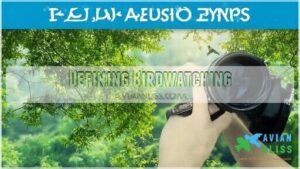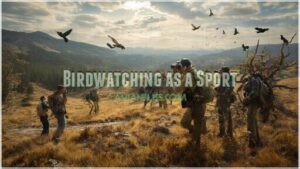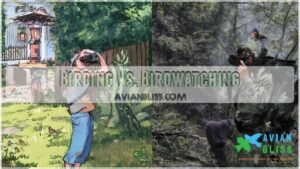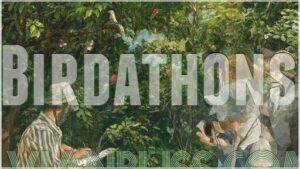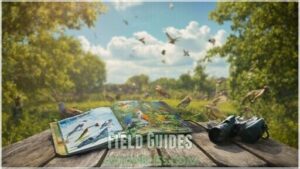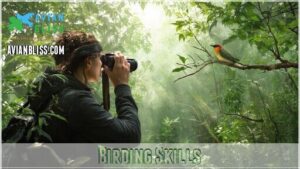This site is supported by our readers. We may earn a commission, at no cost to you, if you purchase through links.
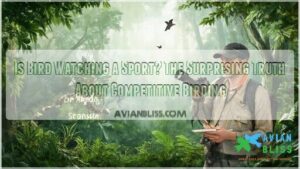 You’ll discover that whether bird watching is a sport depends on how you approach it. Casual backyard birding feels more like meditation than competition, but competitive birding tells a different story entirely.
You’ll discover that whether bird watching is a sport depends on how you approach it. Casual backyard birding feels more like meditation than competition, but competitive birding tells a different story entirely.
When you’re racing against the clock in a Big Day event, hiking miles before sunrise, and using lightning-fast identification skills to spot hundreds of species, it’s definitely athletic. These competitions involve physical endurance, strategic planning, official rules, and serious prizes.
Think of it like chess versus speed chess—same basic activity, completely different intensity levels. The competitive birding world features surprisingly rigorous events that’ll challenge both your body and mind.
Table Of Contents
- Key Takeaways
- Is Bird Watching a Sport?
- Defining Birdwatching
- Birdwatching as a Sport
- Birding Vs. Birdwatching
- Birding Competitions
- Birding Equipment
- Birding Skills
- Frequently Asked Questions (FAQs)
- Is birdwatching a sport?
- Is birding a competitive sport?
- Is birdwatching a hobby?
- Is birdwatching an activity or a competition?
- When did bird watching become a popular sport?
- What is the science of birdwatching?
- Is bird watching competitive?
- Can bird watching be a career?
- What are people who watch birds called?
- What is the study of bird watching called?
- Conclusion
Key Takeaways
- You’ll find bird watching can be both a peaceful hobby and a competitive sport, depending on your approach and intensity.
- Competitive birding events like Big Days and birdathons demand physical endurance, mental sharpness, and strategic planning.
- Serious birders rely on specialized gear like binoculars, field guides, and checklists to enhance their experience and success.
- Birding fosters a connection with nature while offering opportunities for personal achievement and community engagement.
Is Bird Watching a Sport?
The sport debate around birding isn’t black and white.
While you won’t find bird watching competitions on ESPN, this global birding community proves it’s more than casual observation. Serious birders invest physical effort hiking miles, competing in birdathons, and tracking life lists.
While ESPN may overlook it, competitive birders prove this pursuit demands serious athletic commitment and strategic skill.
The birding community’s competitive spirit and future of birding as organized events suggest it’s evolving into legitimate sport territory.
Bird watching also fosters a connection with nature and environmental awareness.
Defining Birdwatching
Birding Definition starts with a simple concept: watching birds in their natural environments. You’ll observe feathered creatures through binoculars, noting their behaviors, calls, and distinctive features.
Bird watching encompasses various Birding Activities from casual backyard observation to serious expeditions tracking rare species.
Birders pursue different Birding Goals—some maintain life lists, others focus on photography or conservation.
The Birding Community welcomes everyone, from weekend enthusiasts to dedicated bird watchers who travel globally.
Birding Benefits include physical exercise, mental relaxation, and deeper nature connections.
Whether you call it birdwatching or birding, it’s fundamentally about appreciating avian diversity.
Birdwatching as a Sport
You’ll find that birdwatching checks many boxes traditionally associated with sports, from physical demands like hiking rugged terrain to competitive elements that’ll get your heart racing.
Serious birders tackle miles of challenging terrain, turning peaceful observation into an athletic pursuit that demands real endurance.
Whether you’re chasing a rare warbler through dense forest or competing in a "Big Day" challenge, this activity combines athletic endurance with mental sharpness in ways that might surprise you.
Physical Exertion
Hiking demands and terrain navigation make birding surprisingly athletic.
You’ll trek miles through forests, climb rocky paths, and wade through marshes chasing rare species.
This strenuous activity burns serious calories while building cardiovascular benefits.
Endurance training becomes essential for dawn-to-dusk expeditions.
Your physical fitness directly impacts success in competitive events, proving birding requires genuine physical exertion beyond casual observation.
A helpful resource is a detailed birdwatching guide for beginners.
Competition
You’re not just collecting species names; you’re entering a world where competitive events matter.
Team birding tournaments like Champions of the Flyway feature prize structures rewarding skilled participants.
Global rankings track your achievements through strategic tracking methods.
These birding competitions transform casual observation into serious competitiveness with established rules governing team competitions worldwide.
Rules and Regulations
Beyond the thrill of competition lies a framework that keeps birding both fair and responsible.
Unlike traditional sports with a single governing body, birding operates through standardization across multiple organizations. The American Birding Association’s ABA Recording Rules provide structure for competitions, while conservation laws and ethical guidelines protect habitats. You’ll navigate permitting requirements and follow protocols for reporting sightings to maintain birding’s integrity.
- Permitting Requirements – Obtain necessary permits for protected areas and respect access restrictions to sensitive habitats
- Conservation Laws – Follow federal and state wildlife protection regulations that prohibit disturbing nesting birds or collecting specimens
- Ethical Guidelines – Maintain proper distance from birds, avoid playback overuse, and prioritize bird welfare over personal listing goals
- Habitat Protection – Stay on designated trails, pack out trash, and minimize environmental impact during birding excursions
- Reporting Sightings – Contribute to citizen science through eBird submissions and alert rare bird networks responsibly without overcrowding locations
Birding Vs. Birdwatching
You might think birdwatching and birding are the same thing, but there’s actually a meaningful difference that separates casual observers from serious competitors.
While birdwatchers enjoy a relaxed hobby of spotting birds in their backyard, birders pursue an intense activity that requires advanced skills, specialized equipment, and often involves traveling great distances to add rare species to their life lists.
Skill Level
Most people think spotting a robin counts as birding expertise.
Actually, there’s a steep learning curve between casual birdwatching and competitive birding mastery levels. Advanced techniques require years of skill development, transforming bird watching skills into something resembling birding as a sport in any competitive setting.
| Skill Level | Birdwatching | Birding |
|---|---|---|
| Identification | Basic common species | Complex field marks |
| Expertise Required | Minimal | Extensive knowledge |
| Learning Curve | Gentle slope | Steep climb |
| Mastery Levels | Beginner-friendly | Expert-level precision |
| Skill Development | Casual observation | Systematic training |
Intensity
Most birders bring serious intensity to their passion, requiring tremendous effort required and time commitment. The physical demands of hiking rugged terrain for hours test your endurance, while mental focus and mental acuity help identify fleeting species.
This passion levels approach transforms casual observation into demanding pursuit.
| Birdwatching | Birding |
|---|---|
| Relaxed weekend strolls | Dawn-to-dusk expeditions |
| Casual bird spotting | Methodical species tracking |
| Comfortable pace | Intense concentration |
| Social enjoyment | Focused dedication |
Competitive Nature
Competition drives birding’s heart, transforming casual observation into intense rivalry. You’ll find yourself racing against time in Big Day challenges or climbing life lists in competitive birding tournaments.
The World Series of Birding exemplifies this competitive nature, where teams battle for the highest species count. To enhance their skills, birders often rely on bird identification techniques to accurately spot and record species.
| Competition Type | Duration | Focus | Skill Level Required | Typical Species Count |
|---|---|---|---|---|
| Big Day | 24 hours | Maximum species | Advanced | 150-250+ |
| Birdathons | Variable | Fundraising + counting | Intermediate | 100-200 |
| Life Listing | Lifetime | Personal records | All levels | 1,000-8,000+ |
| World Series | 24 hours | Team competition | Expert | 200-250+ |
| Local Tournaments | 1-7 days | Regional species | Beginner-Advanced | 50-150 |
Birding Competitions
You’ll discover that birding competitions transform a peaceful hobby into an adrenaline-pumping race against time and fellow enthusiasts.
These events, from Big Days to Birdathons, challenge you to spot as many species as possible while testing your identification skills and endurance in ways that’ll surprise you.
Life Lists
Your life list becomes your birding scorecard—a personal record of every species you’ve identified.
This Species Tracking system drives competitive birding forward, turning casual observation into serious Personal Achievements.
Here’s how List Keeping works:
- Document each new bird with date and location
- Set Birding Goals like reaching 500 species
- Compare Global Sightings with fellow birders
- Celebrate milestones within the birding community
Birdathons
Picture yourself in a 24-hour marathon where you’ll race against time to spot bird species while raising funds for conservation.
Birdathons blend competitive birding hobby with meaningful fundraising goals, creating intense team dynamics around strategic event logistics.
| Birdathon Element | Key Features |
|---|---|
| Duration | 24-hour marathon format |
| Team Structure | Coordinated group strategies |
| Conservation Impact | Funds wildlife organizations |
| Competition Focus | Maximum species counts |
These bird watching events transform casual birdwatching into serious sport through organized bird counts and strategic planning.
Big Days
While birdathons raise funds for conservation, Big Days push competitive bird watching to its limits.
You’ll race against time to identify maximum species within 24 hours, making this one of the most intense formal events in birding.
Big Day planning requires careful preparation:
- Map prime routes through diverse habitats before dawn
- Coordinate Team Big Days with strategic member positioning
- Study recent bird migration patterns and weather forecasts
- Prepare backup locations for unexpected challenges
- Follow strict Big Day ethics for authentic species documentation
Record Big Days showcase incredible performance comparison between regions.
Birding Equipment
You can’t spot a rare warbler hiding in dense foliage with your naked eye, which is why serious birders invest in quality equipment that makes all the difference.
Your binoculars, field guides, and checklists aren’t just accessories—they’re the tools that transform casual bird watching into precise, competitive birding where every identification counts.
Binoculars
Looking through quality binoculars transforms your bird watching experience from squinting at distant specks to observing intricate feather patterns.
This specialized equipment serves as your gateway to the avian world, making proper selection paramount for any serious birder.
Consider these essential binocular features when choosing your bird watching gear:
- Magnification power – 8x provides steady viewing while 10x offers closer detail
- Objective lens diameter – Larger lenses gather more light for brighter images
- Weather resistance – Waterproof construction protects your investment during outdoor adventures
- Ergonomic design – Comfortable grip reduces fatigue during extended birding sessions
To find the right gear, explore best birding binoculars options.
Field Guides
Two Guide Types dominate birding: traditional print and Digital Guides.
Guide Features include detailed illustrations, range maps, and behavioral notes for accurate bird identification.
Smart Guide Selection considers your region and skill level—waterproof editions survive harsh conditions.
Modern birdwatching apps offer real-time updates and sound recordings.
Proper Guide Use transforms casual bird watching into serious birding, making birding field guides essential bird watching gear.
Many enthusiasts purchase specialized guides for specific regions.
Notebooks and Checklists
Beyond your binoculars, notebooks and checklists form the backbone of serious birding data organization.
Whether you’re tracking species for the American Birding Association ABA Checklist or wondering "is birding a sport," proper documentation matters.
Choose waterproof field notebooks for durability. Many birders find that weatherproof paper options are essential.
Essential recording elements include:
- Location and weather conditions
- Species identification with behavioral notes
- Time stamps and abundance counts
Digital checklists streamline species tracking across multiple birding sessions.
Birding Skills
You’ll need to master several core skills to become an effective birder, from identifying species by sight and sound to recording accurate field notes.
These abilities separate casual bird watchers from serious competitive birders who can spot a rare warbler at fifty yards or recognize a hawk’s call from memory.
Bird Identification
Once you’ve got your gear sorted, mastering visual identification becomes your primary birding skill.
You’ll develop sharp identification techniques by studying size, shape, and color patterns.
Field guide use paired with habitat knowledge accelerates learning dramatically.
| Visual Cues | What to Notice |
|---|---|
| Size & Shape | Compare to familiar birds like robins |
| Color Patterns | Wing bars, eye rings, breast markings |
| Behavior Analysis | Feeding style, flight patterns, posture |
Bird Calls and Songs
Beyond visual identification, your ears become powerful tools for bird watching success.
Song identification separates novice birders from experts who recognize species instantly.
- Audio recording helps you capture and study complex bird vocalizations later
- Call variations reveal different meanings – alarm calls versus mating songs
- Habitat sounds create acoustic maps guiding you to specific species locations
Song learning transforms mysterious chirps into familiar voices.
Observation and Note-taking
Accurate field notes transform casual observation into serious data analysis. Your detailed records capture behavior patterns, flight paths, and habitat preferences that memory alone can’t retain.
This mental challenge enhances your birding skills while creating valuable documentation. For reliable note-taking, consider using waterproof notebook options.
Whether sketching wing bars or recording feeding habits, thorough field journaling elevates your leisure activity into meaningful scientific contribution.
Frequently Asked Questions (FAQs)
Is birdwatching a sport?
Absolutely yes, you’ll find birdwatching surprisingly competitive! It demands physical endurance, mental sharpness, specialized equipment, and strategic thinking.
With organized competitions like the World Series of Birding, it’s definitely earned its sport status.
Is birding a competitive sport?
You’ll find birding offers both competitive and casual options.
Formal competitions like Champions of the Flyway and Big Day challenges test your skills.
While personal life lists create friendly rivalry among enthusiasts.
Is birdwatching a hobby?
Yes, you’ll find birdwatching is primarily a hobby that millions enjoy worldwide.
It combines leisure with learning, offering personal fulfillment, stress relief, and nature connection while developing observation skills at your own pace.
Is birdwatching an activity or a competition?
Think you’re just casually watching birds?
You’re actually participating in both!
Birdwatching starts as a peaceful activity but transforms into serious competition when you’re chasing rare species and competing in birding events.
When did bird watching become a popular sport?
Birdwatching gained sport-like popularity in the 1970s when competitive events emerged.
You’ll find the World Series of Birding started in 1984, while "Big Day" challenges and life-listing competitions transformed casual observation into organized, competitive activities.
What is the science of birdwatching?
You’re practicing ornithology when you watch birds – the scientific study of avian behavior, identification, and ecology.
You’ll develop observational skills, learn species classification, and contribute to citizen science through data collection and habitat monitoring.
Is bird watching competitive?
Like hawks circling prey, birders compete fiercely in events like Big Day challenges and the World Series of Birding.
You’ll find yourself racing against time, spotting species, and chasing life lists with surprising intensity.
Can bird watching be a career?
You can build careers in wildlife research, park services, environmental consulting, nature photography, or tour guiding. Many ornithologists started as passionate birders, turning their hobby into fulfilling professional paths.
What are people who watch birds called?
Like moths drawn to flame, enthusiasts who watch birds are called "birdwatchers" or "birders."
You’ll find that "birders" suggests more passion and dedication, while "birdwatchers" covers casual observers enjoying nature’s feathered performers.
What is the study of bird watching called?
You’ll find that ornithology is the scientific study of birds, while birding or birdwatching refers to the recreational hobby.
Ornithologists are professional scientists who research bird behavior, anatomy, and ecology systematically.
Conclusion
Ultimately, whether bird watching is a sport comes down to your personal approach and intensity level.
Casual backyard observation feels more like peaceful meditation, while competitive birding events demand serious athletic skills, endurance, and strategic thinking.
You’ll find that Big Day competitions and birdathons transform this quiet hobby into an adrenaline-fueled challenge.
So next time someone asks if bird watching counts as a sport, you can confidently explain it’s both—depending on how you choose to play.

